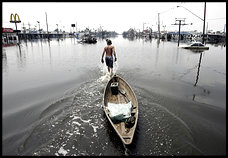Untitled Document
 |
Hurricane Katrina survivor
Paul Metzler pulls his boat along Paris Street in Chalmette, about seven
miles east of New Orleans. Rescuers have begun scouring the community
for survivors |
NEW ORLEANS, Sept. 3 -- To those who wonder why so many stayed behind when push
came to water's mighty shove here, those who were trapped have a simple explanation:
Their nickels and dimes and dollar bills simply didn't add up to stage a quick
evacuation mission.
"Me and my wife, we were living paycheck to paycheck, like most everybody
else in New Orleans," Eric Dunbar, 54, said Saturday.
He was standing on wobbly, thin legs in the bowels of the semi-darkened Louis
Armstrong Airport, where he had been delivered with many others after having been
plucked by rescuers from a roadway.
He offered a mini-tutorial in the economic reality of his life.
"I don't own a car. Me and my wife, we travel by bus, public transportation.
The most money I ever have on me is $400. And that goes to pay the rent. And
that $400 is between me and my wife." Her name is Dorth Dunbar; she was
trying to get some rest after days of peril.
Dunbar estimated his annual income to be about $20,000, which comes from doing
graphic design work when he can get it. Before the storm, when he and his wife
estimated how much money they needed to flee the city, he was saddened by the
reality that he could not come up with anywhere near the several thousand dollars
he might need for a rental car and airfare.
"If I took my wife out to dinner, it was once a month," he said,
sounding as if even those modest good times had come to an abrupt end. "We'd
go to Piccadilly's. Never any movies. Really, it's a simple life. I go to work,
come home, talk to my wife, go to bed, then back to work again. A basic existence."
He was rolling two quarters around in his hand, short 50 cents to make a long-distance
call to his son. As his eyes began to water, he repeated himself: "Just
a basic existence."
The two smooth-faced boys on the floor, sitting on their backpacks, looked
more energetic than most. Corey Wise, 17, and Jermaine Wise, 18, were once residents
of New Orleans's 17th Ward.
"Our family was already in a financially depressive situation before the
hurricane," Jermaine said.
He calculated where the family -- their mother, Marie, is divorced -- stood
financially before the wind, water and destruction.
"We had $300 between us," he said, nodding toward his brother. "Mom
had about $225 worth of savings. That was our emergency savings for anything.
And that was a blessing."

